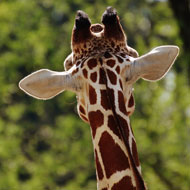Report reveals high death rates at South Lakes zoo

It was previously reported that a giraffe had died after slipping on the concrete floor of its enclosure, which had no more than a scattering of sand, CAPS said. (Stock photo)
Nearly 500 animals have died in just four years at the South Lakes Safari Zoo in Cumbria, reports released by the council have revealed.
The zoo’s owner David Gill has submitted an application for a new licence to operate the zoo, which will be considered by Barrow Council at a hearing on 6 March.
Animal lovers and welfare groups, however, are calling for the zoo to close after inspection reports revealed high death rates, poor management and animal health and welfare issues.
The zoo has previously been fined for health and safety breaches after keeper Sarah McClay was mauled to death by a tiger in 2013.
Inspection reports released by the local council reveal the zoo has a death rate of around 12 per cent of its animals every year. A total of 486 animals died between December 2013 and September last year. Among these were a jaguar euthanised after it chewed off its own paw, an electrocuted tortoise, a rhino crushed against a barrier by another rhino and two snow leopards found partially eaten in their enclosure.
At the November 2016 inspection it was discovered that no heating had been installed, despite the fact that inspectors were told it would be in place by August, before the winter months.
Photographs and video footage taken separately by the Captive Animal Protection Society (CAPS) shows an apparently emaciated kangaroo and penguins with virtually no water in their pool during temperatures of 29ºC.
A spokesperson is quoted by BBC News as saying David Gill has “stepped away from all trading and management activities” at the zoo, which has been leased to Cumbria Zoo Company Limited.
The council is being recommended not to renew to licence, which could result in the zoo’s closure. Councillors will make a decision on 6 March.



 The Veterinary Medicines Directorate (VMD) is inviting applications from veterinary students to attend a one-week extramural studies (EMS) placement in July 2026.
The Veterinary Medicines Directorate (VMD) is inviting applications from veterinary students to attend a one-week extramural studies (EMS) placement in July 2026.